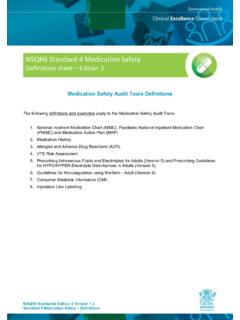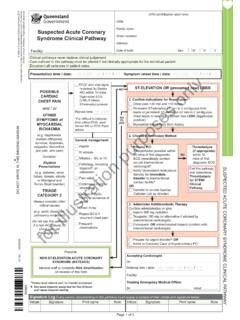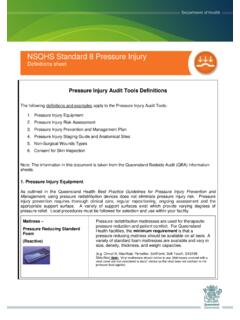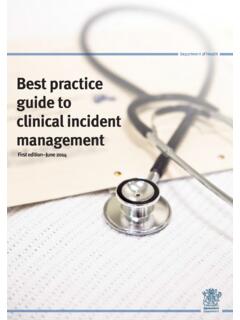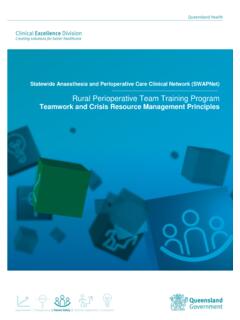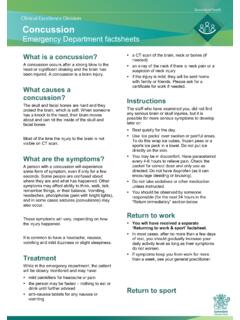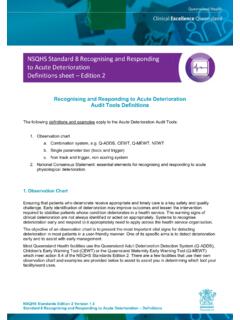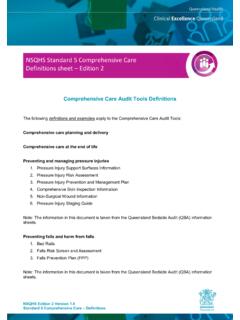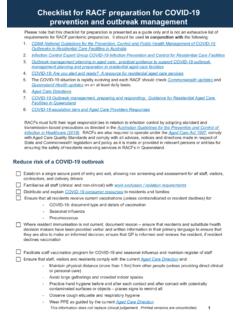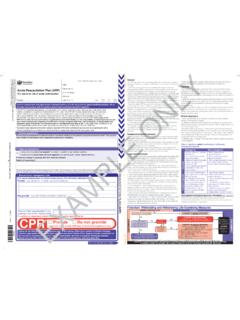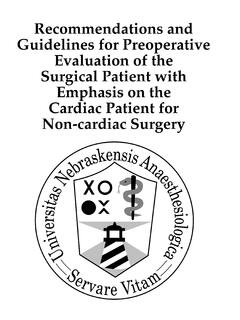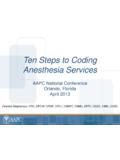Transcription of Preoperative investigation guideline | Statewide ...
1 guideline . Statewide Anaesthesia and Perioperative Care Clinical Network (SWAPNet). Preoperative investigations guideline Statement Preoperative investigations should not be ordered routinely1. Perioperative investigations should be tailored to the individual patient's needs and the surgery they are undergoing. The implementation of guidelines requires planning and a well thought out process to gain compliance. A. change management and communication plan may also be necessary to achieve uptake. The SWAPNet guideline on Pre-anaesthetic Evaluation Framework Implementation guideline ' has been developed to assist hospital and health services in the implementation process.
2 Purpose To provide guidance in the management of Preoperative investigations To ensure an individual approach to Preoperative management To reduce unnecessary ordering of tests and investigations where not indicated. Scope This guideline applies to perioperative testing for all adult patients undergoing elective surgery in a Queensland Health facility. The guideline is based on patient's co-morbidities and the complexity of the surgical procedure being undertaken. Related documents SWAPNet Pre-anaesthetic Evaluation Framework Implementation guideline SWAPNET Triage guidelines for Pre-anaesthetic Evaluation Adult Integrated Pre-Procedure Screening Tool Australian and New Zealand society of Blood Transfusion Ltd, Royal College of Nursing Australia, guidelines for the Administration of Blood Products ANZCA guidelines on Pre-Anaesthesia Consultation and Patient Preparation (PS07).
3 Document details Document title: Perioperative Investigations guideline Publication date: 30 September 2021. Review date: 1 October 2024 (or as required). Amendments: Full version history is detailed on page 6. Author: Statewide Anaesthesia and Perioperative Care Clinical Network Endorsed by: Statewide Anaesthesia and Perioperative Care Clinical Network Steering Committee and Statewide Surgical Advisory Committee Contact: Disclaimer: These guidelines have been prepared to promote and facilitate standardisation and consistency of practice, using a multidisciplinary approach.
4 Information in this guideline is current at time of publication. Queensland Health does not accept liability to any person for loss or damage incurred as a result of reliance upon the material contained in this guideline . Clinical material offered in this guideline does not replace or remove clinical judgement or the professional care and duty necessary for each specific patient case. Clinical care carried out in accordance with this guideline should be provided within the context of locally available resources and expertise. This guideline does not address all elements of standard practice and assumes that individual clinicians are responsible to: Discuss care with consumers in an environment that is culturally appropriate and which enables respectful confidential discussion.
5 This includes the use of interpreter services where necessary Advise consumers of their choice and ensure informed consent is obtained Provide care within scope of practice, meet all legislative requirements and maintain standards of professional conduct Apply standard precautions and additional precautions as necessary, when delivering care. Document all care in accordance with mandatory and local requirements. State of Queensland (Queensland Health) 2021. This work is licensed under a Creative Commons Attribution Non-Commercial No Derivatives Australia licence.
6 In essence, you are free to copy and communicate the work in its current form for non-commercial purposes, as long as you attribute Statewide Anaesthesia and Perioperative Care Clinical Network, Queensland Health and abide by the licence terms. You may not alter or adapt the work in any way. To view a copy of this licence, visit For further information contact the Statewiide Anaesthesia and Perioperative Care Clinical Network (SWAPNet), PO Box 128, RBWH Post Office, Herston Qld 4029, email phone (07) 3328 9164. For permissions beyond the scope of this licence contact: Intellectual Property Officer, Queensland Health, GPO Box 48, Brisbane Qld 4001, email phone (07) 3234 1479.
7 2- guideline FOR PRE-OPERATIVE investigation . Pre-operative evaluation is an important component of the peri-operative management of elective surgery patients and ideally should occur following referral for surgery. Ordering of Preoperative tests occurs before surgical procedures to check for conditions that may affect treatment. This can assist the anaesthetist and surgeon to make decisions regarding the course of treatment and pre and / or post- operative management. Perioperative tests can sometimes be ordered unnecessarily, this can cause delays in treatment and inefficiency in planning surgical care.
8 Inappropriate ordering of routine Preoperative tests can also lead to high costs of health care. This guideline covers routine Preoperative tests for adults who are having elective surgery. It aims to reduce unnecessary testing by providing guidance on which tests to offer before minor, intermediate and major or complex surgery. 1. Recommendations relevant to all patients Pregnancy testing All women of childbearing age should be sensitively questioned on the day of surgery as to whether there is a possibility that they could be pregnant.
9 Women who could possibly be pregnant should be informed of the risks and a pregnancy test should be discussed. Pregnancy tests should be carried out on all women who may be pregnant with their consent. Any relevant discussions should be documented in the clinical notes. There should be locally agreed policies on the administration and checking of pregnancy tests prior to surgery. HBA1c Should not be carried out on patients without known diabetes. In patients with Diabetes, the most recent HBA1c should be included as part of the referral for surgical consultations.
10 Should be checked in patients with diabetes if they have not had it checked within the last 3 months. Urine tests Urine dipstick tests should not be routinely performed prior to surgery. Microscopy and culture of a midstream urine sample should be considered in surgical procedures where the presence of a urinary tract infection would influence the decision to proceed or the choice of prophylactic antibiotics. Chest x-ray Should not be routinely performed prior to surgery. Resting 2D echocardiography Should not be ordered routinely.
